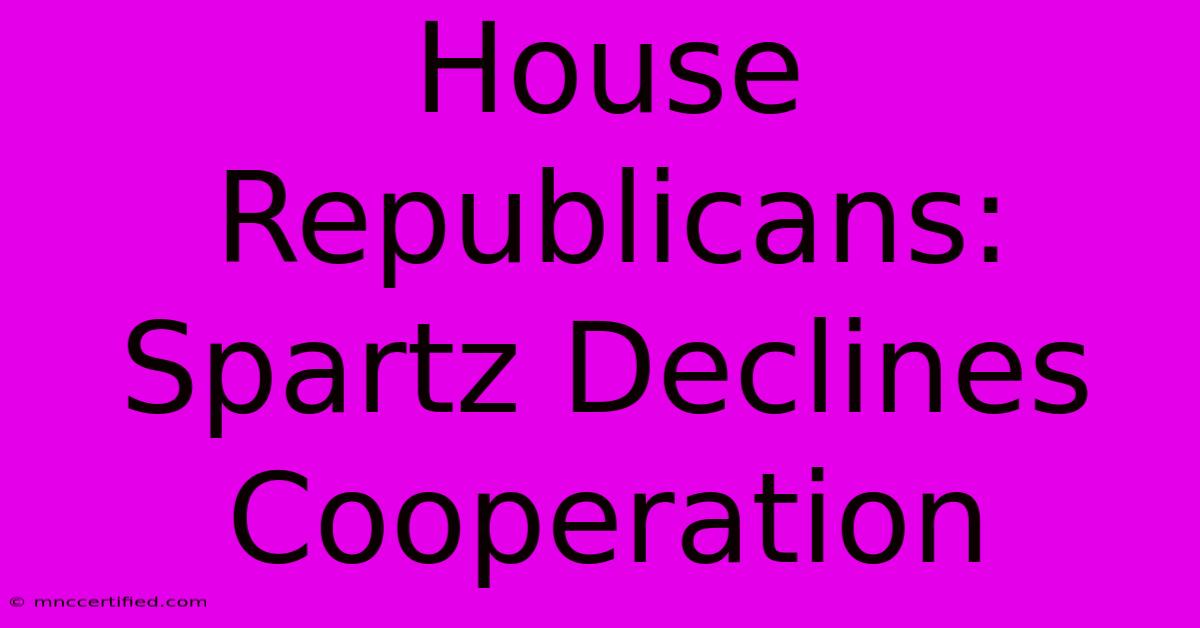House Republicans: Spartz Declines Cooperation

Table of Contents
House Republicans: Spartz Declines Cooperation – A Deeper Dive into the Political Standoff
The recent refusal of Representative Victoria Spartz (R-Ind.) to cooperate with House Republicans has sent ripples through the political landscape, sparking intense debate and speculation. This article delves into the specifics of Spartz's actions, the underlying reasons, and the potential consequences for both the Republican party and the broader political climate.
Understanding Spartz's Decision: A Breakdown of the Key Issues
Representative Spartz's decision not to cooperate with House Republicans stems from a complex interplay of factors, primarily centered around concerns regarding the party's internal dynamics and its approach to key legislative issues. While she hasn't explicitly detailed all her reasons, public statements and political analyses point to several key areas of contention:
Concerns about Party Leadership and Strategy
Spartz has openly expressed concerns about the direction and leadership within the House Republican caucus. She's been critical of the party's internal processes and strategic decisions on various issues, arguing for a more unified and effective approach. Her refusal to cooperate can be interpreted as a direct challenge to the current leadership, aiming to force a reevaluation of strategies. This internal dissent highlights cracks within the Republican party and questions the effectiveness of current leadership strategies.
Disagreements on Policy and Legislation
Beyond leadership concerns, policy disagreements appear to be another significant factor influencing Spartz's decision. Specific legislative initiatives where her views diverge from the party line remain somewhat opaque, but observers note that her past votes and public statements suggest potential conflicts on issues such as government spending, economic policies, and potentially even foreign policy. This divergence suggests a deeper ideological split within the Republican ranks that transcends mere internal squabbling.
The Role of External Pressures and Public Opinion
It's important to consider the potential influence of external pressures and public opinion. Spartz, representing a relatively moderate district, may be responding to the concerns of her constituents, who might hold differing perspectives on certain Republican policies. Balancing her loyalty to the party with the needs of her electorate presents a significant challenge, and her decision could be a reflection of this delicate balancing act. Furthermore, she may be leveraging her public stance to gain leverage within the party, aiming to influence future policy decisions.
Consequences and Future Implications
Spartz's actions have far-reaching implications. For the Republican party, her refusal to cooperate represents a significant setback, particularly considering the already narrow margins in the House. This internal division weakens their legislative capabilities and undermines their ability to present a unified front. The situation also raises questions about the party's ability to govern effectively and achieve its policy goals.
For Spartz herself, the consequences remain to be seen. While her decision might resonate with some voters, it could also alienate others within her party. Her future within the Republican caucus is uncertain, potentially leading to strained relationships with party leadership and fellow members.
Potential for Broader Political Impact
Beyond the immediate repercussions, Spartz's actions could influence the broader political climate. Her decision could embolden other moderate Republicans to express similar dissent, leading to further fracturing within the party and potentially opening avenues for bipartisan cooperation, depending on the issues at hand. Conversely, it could lead to increased party polarization and gridlock.
Conclusion: A Pivotal Moment in Republican Politics
Representative Spartz's refusal to cooperate with House Republicans marks a crucial moment in contemporary American politics. The underlying factors, ranging from internal party dynamics to policy disagreements and external pressures, paint a complex picture. The long-term consequences of this decision will significantly impact the Republican party, the legislative process, and the broader political discourse, making it a pivotal development warranting continued close observation. The coming months will reveal whether this is a temporary disruption or a harbinger of more profound shifts within the Republican party and the nation's political landscape.
Keywords: Victoria Spartz, House Republicans, Republican Party, political standoff, internal dissent, policy disagreements, legislative strategy, political consequences, bipartisan cooperation, American politics.

Thank you for visiting our website wich cover about House Republicans: Spartz Declines Cooperation. We hope the information provided has been useful to you. Feel free to contact us if you have any questions or need further assistance. See you next time and dont miss to bookmark.
Featured Posts
-
Mishal Husains Last Today Episode
Dec 18, 2024
-
Republican House Majority In Jeopardy
Dec 18, 2024
-
Hodgkinson Bbc Sports Personality 2024
Dec 18, 2024
-
Remembering Helen Rollason Bbc
Dec 18, 2024
-
Guinness Supply Crisis In Uk
Dec 18, 2024